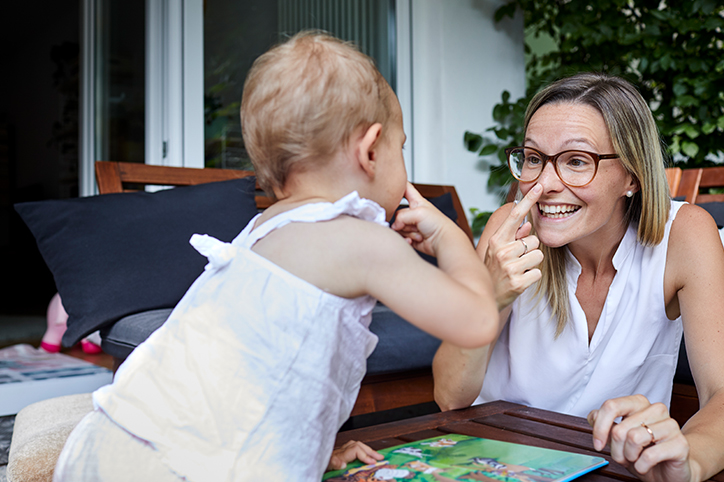I remember the moment I realized I messed up. My youngest daughter was on the potty for the first time, and my four-year-old came into the bathroom, crowding my legs as he was eager to join the celebration. His little voice piped up with an innocent question: “Where’s her willy?”
I’m a mother of three, and I have a degree in psychology. I assure you, I’ve read all the books and tried to do all the right things when it comes to talking to my children. I know that you’re supposed to teach your children the proper anatomical names for their body parts, and I agree with the principles behind this. Yet still I chose to use a silly term when talking to my son about his private areas. Now I was going to have to have to explain the differences between male and female anatomy to a bright and curious 4-year-old. One who likely won’t stop talking about these differences to anyone who will listen for the next few months.
Teaching Kids the Proper Names for Body Parts – Why You Should and Why it Matters
The reason that many of us don’t teach our children the proper names for body parts is simple – we’re hung up when it comes to talking about it. Even as adults! Children are naturally curious and love to learn. They don’t yet have those hang-ups that are the plague of adulthood. Children approach life and learning with a certain matter-of-fact enthusiasm; one that isn’t tainted yet by feelings of shame or embarrassment. When you use silly names for private parts around children, it’s because it triggers something in you as an adult. It isn’t saving the child from any shame or self-consciousness.
There are concrete reasons why you should use the proper anatomical terms when talking with your children. On the surface, it shows them by example to feel comfort with all parts of their body. There’s no underlying message that certain parts should be treated with embarrassment or shame. Teaching your children the proper names for these parts helps your child to adopt a more comfortable and positive outlook towards their bodies. This can be immensely helpful and protective in the later years when their bodies start to change.
Additionally, talking to them about these parts in a straightforward way opens up the lines of communication. These are lines that you want to be as open as possible. As a parent, it’s imperative that your children feel like they can talk to you openly and honestly about their bodies. As protectors of our children, we need them to know that they can come to us if they have been in a situation that made them feel unsafe or uncomfortable. It is a widely accepted fact among psychologists and medical professionals that children knowing the proper terms for their private parts is a protective factor against sexual abuse. If a child is given the message that they should feel self-conscious about specific parts of their body, they won’t be as comfortable to speak up about if they have been in an inappropriate situation. Children who understand the proper names for their body parts are typically more comfortable discussing any issues that arise, and can properly report wrongdoing if they have been a victim of inappropriate behavior.
You might be thinking that by calling your child’s private parts by silly and slang names isn’t necessarily teaching them to feel shameful about those parts. However the fact is, we don’t make up childish terms for our knees, our noses or our elbows. Although the message is not being stated outright, it is being communicated all the same. These parts are different, and your kids are getting the message that you aren’t fully confident in talking about them. If we as parents are confident to open this line of communication, how can we ever expect that our children will be open about it on their end?
I wish that I had been more proactive in teaching my child the proper terms for his body parts My son is still young, and moving forward I will be diligent about checking my own discomfort when it comes to these discussions. Ultimately, this might boil down to a safety issue, and one that can help protect your child in the long run. Additionally, as an adult woman I have lived with a lifetime of body image issues and insecurities, a condition that I don’t ever want my own children to go through. Teaching your child to be unashamed of their body and to be unafraid to come to you with any concerns or issues they may encounter is one of the most important things that you can do as a parent.
More About Body Image:
- I Grew Up Obsessed With My Body Image & I’m Terrified My My Daughter Will, Too
- I Won’t Let Your Body Image Issues Damage My Daughter
- Body Conscious Swimsuit Guide for Teens? Hell.No.








